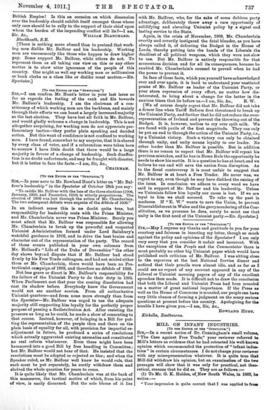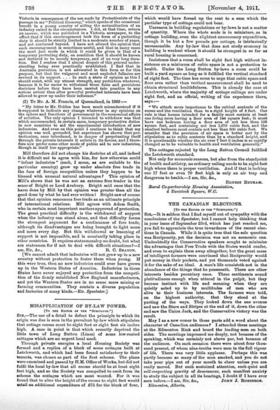MILL ON INFANT INDUSTRIES.
[To THE EDITOR OF TEE "SPECTATOR."]
Sm,—In a recent notice of Dr. Cunningham's small volume, " The Case against Free Trade," your reviewer referred to Mill's letters as evidence that he had retracted his well-known opinion which recommended the protection of " infant hulas- tries " in certain circumstances. I do not charge your reviewer with any misrepresentation whatever. It is quite true that Mill did withdraw hia opinion, but an examination of the two passages will show that it was only for practical, not theo- retical, reasons that he did so. They are as follows :—
(1) To Mr. G. K. Holden, of New South Wales, in 1868, he writes :— " Your impression is quite correct that I was applied to from
Victoria in consequence of the use made by Protectionists of the passage in my "Political Economy," which speaks of the occasional benefit in a young country of aiding the naturalization of an industry suited to the circumstances. I did, at that time, return an answer, which was published in a Victoria newspaper, to the effect that if this encouragement took the form of a protecting duty it should be strictly limited to a moderate number of years, and not continued beyond. I have not altered the opinion that such encouragement is sometimes useful, and that in many cases the most just mode in which it could be given is that of a temporary protecting duty, on condition that it should be known and declared to be merely temporary, and of no very long dura- tion. But I confess that I almost despair of this general under- standing being ever practically established. I find that in Australia protection is not advocated in this form or for this purpose, but that the vulgarest and most exploded fallacies are revived in its support. . . . In such a state of opinion as this I should resist, with my utmost strength, any protection whatever, because it is far easier to withstand these false and pernicious doctrines before they have been carried into practice to any serious extent than after powerful protected interests have been allowed to grow up under their influence."
(2) To Mr. A. M. Francis, of Queensland, in 1869
" My letter to Mr. Holden has been much misunderstood if it is supposed to indicate any change whatever in my opinions on the sphere and functions of government in the economical affairs of societies. The only opinion I intended to withdraw was that which recommended, in certain oases, temporary protective duties in new countries to aid the experimental introduction of new industries. And even on this point I continue to think that my opinion was well grounded, but experience has shown that pro- tectionism, once introduced, is in danger of perpetuating itself through the private interests it enlists in its favour, and I there- fore now prefer some other mode of public aid to new industries, though in itself less appropriate."
Mill therefore did not change his doctrine at all, and indeed it is difficult not to agree with him, for how otherwise could "infant industries" (such, I mean, as are suitable to the particular country) grow up under absolute free trade in the face of foreign competition unless they happen to be blessed with unusual natural advantages P This opinion of Mill's shows that he was not an extreme free trader in the sense of Bright or Lord Avebury. Bright said once that the harm done by Mill by that opinion was greater than all the good done by what he had ever written ! Bright saw of course that that opinion renounces free trade as an ultimate principle of international relations. Mill agrees with Adam Smith, who in certain most important matters approved of protection. The great practical difficulty is the withdrawal of support when the industry can stand alone, and that difficulty forms the strongest argument for a continuance of free trade, although its disadvantages are being brought to light more and more every day. But this withdrawal or lessening of support is not impossible, and is constantly taking place in other countries. It requires statesmanship no doubt, but what are statesmen for if not to deal with difficult situations P—I [We cannot admit that industries will not grow up in a new country without protection to foster them when young. If this were true, then no new industries could ever have grown up in the Western States of America. Industries in those States have never enjoyed any protection from the competi- tion of the firmly established New England manufacturers, and yet the Western States are in no sense mere mining or farming communities. They contain a diverse population said factories of many kinds.—ED. Spectator.]







































































 Previous page
Previous page